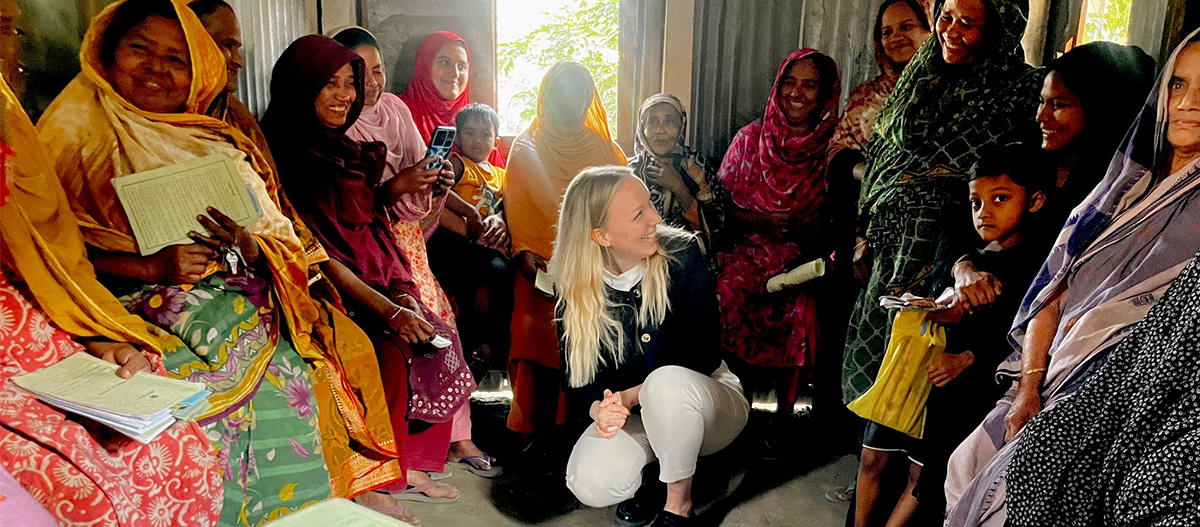
At Yunus Environment Hub (YEH), we see social business as a dynamic and impactful way to tackle environmental challenges. As a global organization, we address critical issues such as climate change, biodiversity loss, and pollution by developing innovative solutions that drive lasting change. Our work spans diverse areas, from advancing circular economy initiatives and waste management strategies to fostering social business models that create meaningful impact.
As Program Director at YEH, I lead the development and implementation of programs that drive environmental solutions and empower social businesses to contribute to a more resilient future.
On a recent visit to Bangladesh, I was able to witness firsthand the transformative power of social business as I visited several of Nobel Peace Prize Laureate Professor Muhammad Yunus’ Grameen social businesses. Seeing these businesses in operation deepened my belief in the potential of social business as a force for real change, generating tangible environmental and social benefits while fostering economic resilience.
Grameen Shakti: Advancing Renewable Energy Through Solar Home Systems
At Grameen Shakti, a social business that provides off-grid solar home systems, I saw firsthand how decentralized renewable energy is changing the landscape of rural electrification. It replaces unreliable or polluting energy sources like kerosene, coal, or diesel that many rural households and businesses rely on for lighting and power.
It was powerful to see how something as seemingly basic as reliable access to electricity can change a whole way of life – children can study at night, local businesses can stay open longer to sell durable goods and run technology, and households no longer have to inhale toxic fumes from burning fossil fuels indoors. In addition to improved livelihoods, the environmental benefits are clear: reduced carbon emissions, less indoor air pollution, and less deforestation from biomass use.
This experience reinforced my belief that renewable energy is not only about reducing emissions, but also about driving social and economic progress, as Grameen Shakti’s decentralized solar solutions empower communities, improve livelihoods, and demonstrate that sustainability and inclusive development must go hand in hand.
Grameen Kalyan: Expanding Healthcare Access for Sustainable Development
The visit to Grameen Kalyan underscored the power of holistic solutions—those that go beyond treating symptoms to drive systemic change. With centers spread across Bangladesh, this social business provides affordable healthcare to low-income communities while integrating microfinance to ensure medical treatment remains accessible without pushing families into debt. What stood out to me was its dual impact on public health and the environment. By decentralizing healthcare, fewer people must travel long distances to urban hospitals, significantly cutting transportation emissions while enabling timely medical intervention.
Preventive care also further enhances environmental sustainability by reducing reliance on energy-intensive emergency services, minimizing medical waste, and alleviating strain on hospital infrastructure. Hence, addressing health issues early lowers resource consumption while improving overall well-being. The integration of financial support not only makes healthcare more accessible but also strengthens economic stability, reinforcing both social and environmental benefits. Witnessing the intersection of financial inclusion, public health, and sustainability to me was a powerful reminder that meaningful solutions require interconnected thinking.
Grameen Bank: Microfinance as a Driver of Economic and Environmental Resilience
Grameen Bank’s microfinance model is well known, but what became clear to me during my visit was its often-overlooked role in supporting environmental sustainability. Many of their loans go toward regenerative agriculture, e-mobility projects, and waste management initiatives, underscoring how financial inclusion can be used to promote climate-smart businesses. Meeting women entrepreneurs who had used microloans to develop businesses—whether in regenerative agriculture, livestock, or small-scale recycling—was a powerful example of how economic empowerment and environmental impact are not separate goals, but deeply interconnected forces for change. Microfinance isn’t just about lifting people out of poverty; it’s about building long-term resilience—both social and environmental.
The Power of Social Business: Driving Systemic Change Through Innovation
Sustainability is one of those words that gets used a lot but seeing it in action in Bangladesh made it real in a way I hadn’t quite experienced before. These visits were both a lesson and a reminder that social business is not just an economic model—it is a framework that simultaneously tackles economic, social, and environmental challenges. What struck me most was the interconnectedness of it all. Energy access, healthcare, financial inclusion—each piece reinforcing the others, creating solutions that are not just impactful but scalable and self-sustaining.
It’s easy to talk about sustainability in abstract terms, but in Bangladesh, social businesses prove that economic growth and environmental responsibility don’t have to be at odds. In fact, they thrive together. They’re not waiting for top-down solutions; they’re creating them from within, building resilience where it matters most. Seeing this in person reaffirmed why I believe so strongly in YEH’s mission. These businesses show us that sustainability isn’t just a technical challenge—it’s about people, livelihoods, and rethinking how we design our economies.
As YEH continues to support social businesses globally, I carry these lessons with me. The insights I gained firsthand won’t just sit in my notebook; they will shape the way I approach my work—developing and scaling solutions that don’t just minimize harm but actively create a better, more just world.
Sustainability isn’t just a concept. It’s something you can see, touch, and build—if we choose to.
Photo credit: Yunus Environment Hub